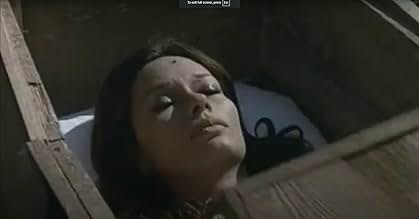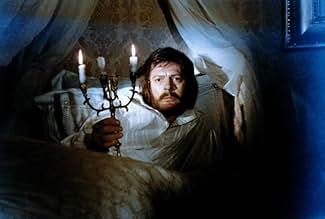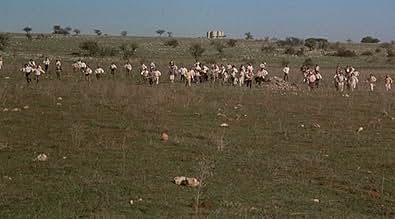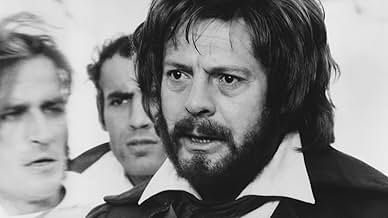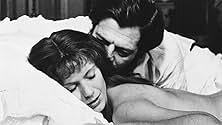IMDb-BEWERTUNG
7,0/10
1402
IHRE BEWERTUNG
Ein Anarchistenführer möchte sich zur Ruhe setzen, da er alt und müde ist. Er versucht, sich zu verstecken, aber seine Freunde finden ihn und bestehen darauf, dass er ihnen weiterhin hilft.Ein Anarchistenführer möchte sich zur Ruhe setzen, da er alt und müde ist. Er versucht, sich zu verstecken, aber seine Freunde finden ihn und bestehen darauf, dass er ihnen weiterhin hilft.Ein Anarchistenführer möchte sich zur Ruhe setzen, da er alt und müde ist. Er versucht, sich zu verstecken, aber seine Freunde finden ihn und bestehen darauf, dass er ihnen weiterhin hilft.
- Regie
- Drehbuch
- Hauptbesetzung
- Auszeichnungen
- 3 Nominierungen insgesamt
Empfohlene Bewertungen
In early 19th century Italy a middle aged radical called Fulvio Imbriani (Marcello Mastroianni) finds his loyalty and commitment to his political comrades being tested after he is released by the Italian regime. Released in1974 writer/directors Paolo and Vittorio Taviani's feature film is a historical melodrama set during 'The Restoration', and filmed in a mix of opulent settings, and at times bare landscapes and lakes. Dealing with a similar theme to the Taviani's previous film 'St. Michael Had a Rooster', like that film it has a certain amount of comparatively complex psychologising and irony about the mental trauma of a revolutionary whose faith in the cause is slipping. It's a story of the ties of family and the past, the corruption of class, self-interest, and the power of money and position, versus political commitment and conviction, and general communal interest. A lot of the film's effect is achieved through a kind of 'visual psychology' encompassing colour, landscape, set, composition, movement, and other visual devices ( this is a good visual film with cinematography by Giuseppe Ruzzolini), combined with music, to create a film parts of which almost seem like a kind of train of thought. In the words of 'La Marseillaise' - 'Allons Enfants/Arise Children', from the lies and fantasy of your world.
Allonsanfan is one of those rare foreign language films about which dedicated viewers know a lot without having gotten a chance to see it. It is rather unfortunate that this classic film directed by Taviani brothers has neither been shown repeatedly on TV screens around the world nor its DVD is as easily available as that of "Braveheart".If we look closely at the productivity of Italian cinema,we will come to know that there is only an Italian film ("La nuit de Varennes" directed by Ettore Scola) which similar to it in terms of style and content.Allonsanfan is quite similar to a Hungarian auteur Miklos Jancso's film but with no nudity,no brutality and no humiliation.At the core of this film is a detailed description of the tough life of a determined revolutionary.Sometimes he is trusted by his followers, sometimes he is not.Family ties are of great importance for him as any other aristocrat.The only unusual aspect of his behavior is that he does not know how to maintain them.Betrayal is a repetitive element of this film as there are plenty of disloyal souls linked to our strongman.This is the reason why he fails to remain neither a true revolutionary nor a true aristocrat.The portrayal of incest is rather out of place for this film.It loses its credibility because of prevalence of dramatic situations.It is true that "Allonsanfan" is visually exquisite but it is somewhat difficult to follow the film's flow as not much of historical context is provided to the viewer.One can say that events happen of their own accord.It is only after reaching the halfway mark that viewers comprehend that Allonsanfan is one of the this film's important protagonists.A positive thing about it is its star cast with remarkable performances by Marcello Mastroianni.A must see for all the admirers of auteur cinema especially of Vittorio and Paulo Taviani.
Dreadful and pretentious film. The script is plain awful - scenes are entirely disconnected, with things happening without any logic or reason. Entire parts could be cut out because they serve absolutely no purpose (for instance, Fulvio taking his son Massimiliano to a restaurant). Many scenes pretend to have a lot of "significance" but are void of any true meaning whatsoever (for example, their sensual eating of gelato or the carnival woman "giving birth"). The various battle scenes are the quality of Monty Python skits, and monologues often reminded me of middle school productions. The Taviani brothers are enamored with setting up beautiful "tableaux", but without any true justification, these artful images just look pretentious. I have been a great admirer of Italian cinema (and indeed of most things Italian) for many years, but at times one must recognize an abysmal work for what it is.
Of course you have to like the Taviani brothers style, something rather hard for viewers contaminated with the fast moving, predictable (even when trying hard to be unpredictable) plots of Hollywood McDonalds-style commercial movies. Taviani brothers take a bitter look at Italy of the '70's, the time when several leftist revolutionary groups, like the Brigade Rosse, the Autonomia Operaia and the Lotta Continua, chose the path of armed struggle against Italian capitalism, ending in a horrible massacre of politicians, judges, and innocent people. Just like them Fulvio, is of a wealthy, aristocratic origin and his revolutionary stance is just sentimental, not backed by real-life status. He gets easily disillusioned, but, caught in a moving sand, however he struggles to reclaim his past life he gets trapped and is swallowed in the end. It is hard to watch a film that you cannot identify with anyone, but it is worth a try.
On the video box of Allonsafan, I noticed that someone had written in small letters, "Boreing". So, was it? On the whole, I am not the biggest fan of Italian films, and Marcello Mastrianni I always feel is his and miss. But actually, Ansofan isn't as bad a film that many people perceive it to be, although it essentially goes all over the place, the film is somewhat entertaining. Mastrianni is certainly OUT there playing a member of a criminal gang. He wants to go straight, but members of his gang keep showing up every time he's trying to go straight. He also has a son to think about! And his love life! Nevertheless, the gang members seem to follow him like a bad rash, even when he tries to kill the annoying pests. What this all is supposed to mean is rather confusing, and the ending is pretty predictable if you've been paying attention to this love/hate relationship thing Mastrionni has got going. Not entirely boring, but then again, not entirely comprehensible either.
Wusstest du schon
- WissenswertesTitle derived from the first two words of the French national anthem.
- VerbindungenEdited into Marcello, una vita dolce (2006)
Top-Auswahl
Melde dich zum Bewerten an und greife auf die Watchlist für personalisierte Empfehlungen zu.
- How long is Allonsanfan?Powered by Alexa
Details
Box Office
- Weltweiter Bruttoertrag
- 782 $
- Laufzeit
- 1 Std. 50 Min.(110 min)
- Sound-Mix
- Seitenverhältnis
- 1.85 : 1
Zu dieser Seite beitragen
Bearbeitung vorschlagen oder fehlenden Inhalt hinzufügen

